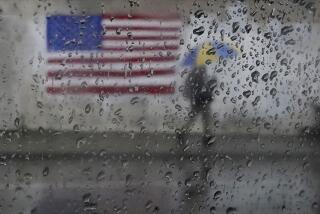You can’t appease terrorists
- Share via
IN THE LAST FEW DAYS I have had the opportunity to speak at the annual conventions of the Veterans of Foreign Wars and the American Legion. It is always a humbling experience to be in the presence of those who have served and fought for our country during some of our darkest, most trying times -- when it was unclear whether our way of life would prevail.
We are again engaged in conflicts that are testing whether we believe that the defense of liberty is worth the cost. And again, there are those who disagree with the mission, who question whether it is worth the sacrifice. This is to be expected in a time of war.
Today, some think that World War II and the Cold War were black-and- white affairs: good versus evil. But there were always those who thought that we should retreat within our borders.
In an effort to avoid repeating the carnage of World War I, much of the Western world tried to appease the growing threats in Europe and Asia in the years before World War II. Those who warned against the rise of Nazism, fascism and communism were often ridiculed and ignored.
The enemy we face today is different from the enemies we have faced in the past, but its goal is similar: to impose its fanatical ideology of hatred on the rest of the world.
In speaking to our veterans, I suggested several questions to guide us during this struggle against violent extremists:
* With the growing lethality and availability of weapons, can we truly afford to believe that vicious extremists can somehow be appeased?
* Can we really continue to think that free countries can negotiate a separate peace with terrorists?
* Can we truly afford to pretend that the threats today are simply “law enforcement” problems rather than fundamentally different threats requiring fundamentally different approaches?
* Can we truly afford to return to the destructive view that America -- not the enemy -- is the real source of the world’s troubles?
These are the central questions of our time, and, as in all periods of conflict, we have no choice but to face them honestly.
The last question is particularly important, because this is the first war of the 21st century -- a war that, to a great extent, will be fought in the media on a global stage. We cannot allow the terrorists’ lies and myths to be repeated without question or challenge.
We also should be aware that the struggle is too important -- the consequences too severe -- to allow a “blame America first” mentality to overwhelm the truth that our nation, though imperfect, is a force for good in the world.
Consider that a database search of the nation’s leading newspapers turns up 10 times as many mentions of one of the soldiers punished for misconduct at Abu Ghraib than of Sgt. 1st Class Paul Ray Smith, the first recipient of the Medal of Honor in the global war on terror.
Then there is the case of Amnesty International, a long-respected human-rights organization, which called the detention facility at Guantanamo Bay the “gulag of our times” -- a reference to the vast system of Soviet prisons and labor camps where innocent citizens were starved, tortured and murdered. The facility at Guantanamo Bay, by contrast, includes a volleyball court, basketball court, soccer field and library (the book most requested is “Harry Potter”). The food, served in accordance with Islamic diets, costs more per detainee than the average U.S. military ration.
With examples like these prevalent in the world media, I do worry about the lack of perspective in our national dialogue -- a perspective on history and the new challenges and threats that free people face today. Those who know the truth need to speak out against the myths and distortions being told about our troops and our country. My remarks at the Veterans of Foreign Wars and American Legion conventions have generated much discussion. I encourage everyone to read what I actually said at defenselink.mil/speeches.
More to Read
Sign up for Essential California
The most important California stories and recommendations in your inbox every morning.
You may occasionally receive promotional content from the Los Angeles Times.










